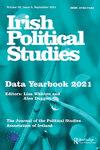Bridge-builder feminism: the feminist movement and conflict in Northern Ireland
IF 0.8
4区 社会学
Q3 POLITICAL SCIENCE
引用次数: 3
Abstract
ABSTRACT While gender has been widely used as an analytical category to understand the dynamics of conflict transformation in Northern Ireland, surprisingly little has been written on the ways in which the conflict has shaped or constrained feminist organising. Singular focus on groups or initiatives like the Northern Ireland Women's Coalition, Peace People or the Women's Support Network has overshadowed the contested history and intricacies of the wider feminist movement. Adopting a more holistic view, this article takes the concept of ‘bridge-builders' as conceptualised by Ruane and Todd in The Dynamics of Conflict in Northern Ireland (1996) to examine the fractured development of the feminist movement in the North. It charts how ‘bridge-builder feminism' became a distinguishable feature of the feminist movement during the Troubles and was used as a mechanism to transgress what Todd calls the ‘grammars of nationality’ (Todd, 2015). I argue that although this organising approach pioneered some changes in Northern Irish society, it overlooked key feminist struggles and thrived at the expense of an inclusive, intersectional feminism. Though the movement has undergone significant changes in the last two decades, the legacy of bridge-builder feminism continues to impact the capacities of the movement to address key feminist issues.搭建桥梁的女权主义:北爱尔兰的女权运动与冲突
虽然性别被广泛用作理解北爱尔兰冲突转变动态的分析类别,但令人惊讶的是,关于冲突塑造或限制女权主义组织的方式的文章很少。对北爱尔兰妇女联盟(Northern Ireland Women’s Coalition)、和平人士(Peace People)或妇女支持网络(Women’s Support Network)等团体或倡议的单一关注,掩盖了更广泛的女权运动的争议历史和复杂性。采用更全面的观点,本文采用Ruane和Todd在《北爱尔兰冲突的动态》(1996)中提出的“桥梁建设者”的概念来考察北爱尔兰女权运动的断裂发展。它描绘了“桥梁建设者女权主义”如何在“麻烦”期间成为女权主义运动的一个显著特征,并被用作违反托德所说的“国籍语法”的机制(托德,2015)。我认为,尽管这种组织方式在北爱尔兰社会中开创了一些变革,但它忽视了关键的女权主义斗争,并以牺牲包容、交叉的女权主义为代价而蓬勃发展。尽管女权运动在过去二十年中经历了重大变化,但桥梁建设者女权主义的遗产继续影响着女权运动解决关键女权主义问题的能力。
本文章由计算机程序翻译,如有差异,请以英文原文为准。
求助全文
约1分钟内获得全文
求助全文

 求助内容:
求助内容: 应助结果提醒方式:
应助结果提醒方式:


